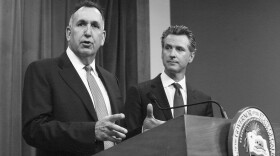Think "grass-roots politics," and what's the first thing that comes to mind?
How about two dozen multimillionaires with open checkbooks?
That's what an NPR analysis of annual IRS filings by Crossroads Grassroots Policy Strategies shows. Despite its name and the repeated use of the word "grassroots" in those documents, nearly 90 percent of the $77 million raised by the Karl Rove-founded group in its first 18 months came from donors who gave at least $1 million.
There were 16 such donors in the group's first year of existence, June 1, 2010 to May 31, 2011, and eight donors from June 1, 2011 through Dec. 31, 2011. The donations included two for $10 million each, one for $5 million, and three for $4 million.
There is no way of knowing whether those eight later donors are partly or entirely included in the group of 16 earlier donors. There is no way of knowing this because, as Crossroads GPS is a tax-exempt, 501(c)4 "social welfare" organization, it does not reveal the names of its donors.
Both Crossroads GPS and its associated American Crossroads superPAC were created by Rove and his Republican allies following the 2010 Citizens United Supreme Court ruling that invalidated a section of the 2002 McCain-Feingold campaign finance law. In their first year, the two groups raised roughly comparable amounts — $35.5 million for American Crossroads and $48.4 for Crossroads GPS.
In the first three months of this year, the figures are $9.7 million for American Crossroads and $39.3 million for Crossroads GPS.
Both groups can and did run political ads, supporting Republicans and attacking President Obama. American Crossroads has also been funded primarily by multimillionaires. The main difference is that while American Crossroads' donors have been revealed (sometimes receiving unwanted publicity as a consequence), Crossroads GPS' donors have remained anonymous.
That, however, could change if the group's critics have their way. The liberal organization Democracy 21 has asked the IRS to reject the Crossroads GPS application for formal nonprofit status because of the political nature of many of its ads.
S.V. Dáte is the NPR Washington Desk's congressional editor.
Copyright 2023 NPR. To see more, visit https://www.npr.org. 9(MDAzMjM2NDYzMDEyMzc1Njk5NjAxNzY3OQ001))






